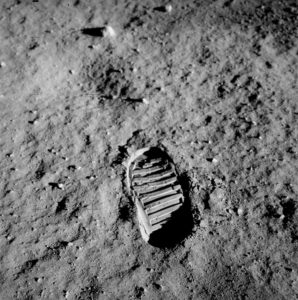
What a thrilling ride the space program was in the 50’s and 60’s. Russia whizzed off Uncle Sam with a little metallic sphere called Sputnik, and the race was on.
John Kennedy, still stinging from the Bay of Pigs fiasco, made a speech in 1961 in which he set the goal of landing a man on the moon before the end of the decade. It made the public go “hmm . . .”
And, though it seemed like a very difficult goal to reach, on July 20, 1969, it was accomplished. And if you remember JFK, you also remember that moment when an announcement was made: “Houston, Tranquility Base here. The Eagle has landed.” And a few hours later, Armstrong’s immortal line was spoken as he casually stepped out onto the moon, for the first time in human history.
I remember getting to stay up late to watch the event. I watched breathlessly as he descended the ladder, stepped off, paused a moment, and stated “That’s one small step for (static) man, one giant leap for mankind.”
The static forever raised the issue of whether Armstrong flubbed his line. An “a” would have made more sense. But the static could well have covered it up.
Such is human nature. Perhaps the single greatest accomplishment of the 1960’s, and we argue about what exactly was said. All I know is that if I had just taken control of a spacecraft from a computer that was guiding it towards a field of boulders, found a better landing spot, and set the craft down with 15 seconds of fuel, my first words would probably have been “Holy crap!” or something to that effect.
I remember walking out in the yard and looking up at the moon, a little bigger than half full. I was stunned at the age of nine that, at that moment, men were walking on its surface.
We didn’t realize it at the time, but this was the climax of the space program. Many more trips to the moon were planned, but some were canceled as public interest waned and the cost of the trips was seen as too much when we had problems here on earth.
Speaking of that, one more permanent effect from that night in July so long ago was the addition of this introductory phrase to man’s vocabulary: “If they can put a man on the moon, then why can’t they . . .”